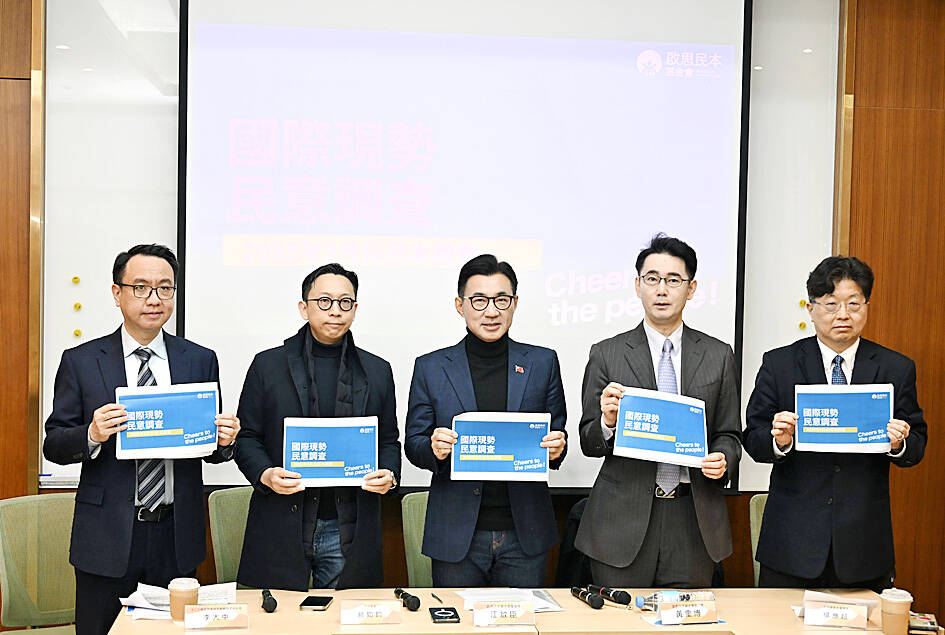More than 80 percent of Taiwanese opposed transferring Taiwan Semiconductor Manufacturing Co’s (TSMC) advanced technology to the US, a survey conducted by the Foundation for the People showed yesterday.
The foundation yesterday held a news conference to announce the results of its poll about the international situation, which was attended by the foundation’s chairman and Deputy Legislative Speaker Johnny Chiang (江啟臣).
The poll showed that 85.6 percent of Taiwanese believed US President Donald Trump’s administration could pressure Taiwan by imposing higher tariffs, while 52.8 percent of respondents said harsher US tariffs are “very likely” to happen and 10.7 percent said they are “unlikely” or “impossible.”

Photo: Lo Pei-de, Taipei Times
Asked whether current Taiwan-US trade is equal and fair, 40.6 percent of respondents said it is, and 49.0 percent said it is not. Additionally, 62.4 percent of respondents believed that the US has an advantage over Taiwan, while 24.8 percent saw it the other way around.
To lessen Taiwan’s trade surplus with the US, 59.5 percent of respondents said Taiwan should purchase arms and military systems, 41.6 percent picked fossil fuels and nuclear energy, 35.4 percent chose agricultural products, 12.5 percent went with cars and 11.5 percent picked computers and components, the results showed.
Up to 83.8 percent of respondents agreed that Taiwan’s semiconductor sector, led by TSMC, can be regarded as the “economic central mountain range” safeguarding the nation against Chinese military threats, while 8.8 percent disagreed.
As for whether Taiwan’s semiconductor industry serves as a “silicon shield” that would prompt military intervention from the US and other Western countries if China were to attack, 62.5 percent agreed and 30.8 percent disagreed.
Asked whether they agreed with Trump’s remark that Taiwan “stole” the US’ semiconductor businesses, 88.4 percent of respondents said they did not, while 9.5 percent said they did.
As for whether the Ministry of Economic Affairs should allow TSMC to transfer its advanced 2-nanometer process to the US if Trump makes more pressing demands, 84.8 percent said the ministry should not, while 10.9 percent said it should.
The poll also showed that 50 percent of respondents agreed that the governing Democratic Progressive Party had proactively negotiated with Washington to deal with Trump’s demands, while 42.6 percent disagreed.
As for the future of the US-China relationship, 13.4 percent of respondents said they believed it would get better, while 37.4 percent said the “status quo” would remain and 40 percent said it would worsen.
Chiang said that under Trump 2.0, talks would continue, with tariffs as a weapon.
Trump is testing countries to see what they would use as bargaining chips to trade with the US, he said.
In this “great negotiation era,” the government should establish its negotiation goals and strategies as soon as possible, Chiang said.
Taiwan should also develop other industries’ competitive edges instead of relying solely on TSMC, he said, adding that the semiconductor sector accounts for a huge portion of the nation’s GDP.
The survey was conducted by the foundation through the Internet, with respondents aged 20 or older nationwide. It collected 1,042 valid responses from Tuesday last week to Friday last week and has a margin of error of 3.03 percentage points.
The questionnaires were given to participants via Facebook advertisements, with raking ratio estimation used to ensure the sample is representative of the nation’s demographics in gender, age, region and educational background.

Taiwan has received more than US$70 million in royalties as of the end of last year from developing the F-16V jet as countries worldwide purchase or upgrade to this popular model, government and military officials said on Saturday. Taiwan funded the development of the F-16V jet and ended up the sole investor as other countries withdrew from the program. Now the F-16V is increasingly popular and countries must pay Taiwan a percentage in royalties when they purchase new F-16V aircraft or upgrade older F-16 models. The next five years are expected to be the peak for these royalties, with Taiwan potentially earning

STAY IN YOUR LANE: As the US and Israel attack Iran, the ministry has warned China not to overstep by including Taiwanese citizens in its evacuation orders The Ministry of Foreign Affairs (MOFA) yesterday rebuked a statement by China’s embassy in Israel that it would evacuate Taiwanese holders of Chinese travel documents from Israel amid the latter’s escalating conflict with Iran. Tensions have risen across the Middle East in the wake of US and Israeli airstrikes on Iran beginning Saturday. China subsequently issued an evacuation notice for its citizens. In a news release, the Chinese embassy in Israel said holders of “Taiwan compatriot permits (台胞證)” issued to Taiwanese nationals by Chinese authorities for travel to China — could register for evacuation to Egypt. In Taipei, the ministry yesterday said Taiwan

Taiwan is awaiting official notification from the US regarding the status of the Agreement on Reciprocal Trade (ART) after the US Supreme Court ruled US President Donald Trump's global tariffs unconstitutional. Speaking to reporters before a legislative hearing today, Premier Cho Jung-tai (卓榮泰) said that Taiwan's negotiation team remains focused on ensuring that the bilateral trade deal remains intact despite the legal challenge to Trump's tariff policy. "The US has pledged to notify its trade partners once the subsequent administrative and legal processes are finalized, and that certainly includes Taiwan," Cho said when asked about opposition parties’ doubts that the ART was

If China chose to invade Taiwan tomorrow, it would only have to sever three undersea fiber-optic cable clusters to cause a data blackout, Jason Hsu (許毓仁), a senior fellow at the Hudson Institute and former Chinese Nationalist Party (KMT) legislator, told a US security panel yesterday. In a Taiwan contingency, cable disruption would be one of the earliest preinvasion actions and the signal that escalation had begun, he said, adding that Taiwan’s current cable repair capabilities are insufficient. The US-China Economic and Security Review Commission (USCC) yesterday held a hearing on US-China Competition Under the Sea, with Hsu speaking on